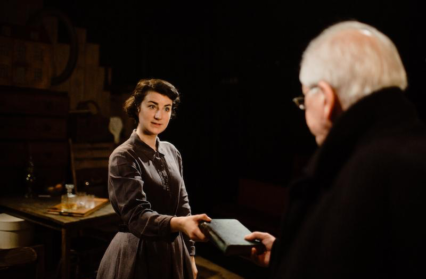David Cottis reviews a worthy revival of The Wind of Heaven by Emlyn Williams and the Finborough Theatre in London.
The playwright and actor Emlyn Williams stands as a prime example of the maxim that a Welshman is never more Welsh than when outside the nation. Raised in Glanrafon, and exclusively Welsh-speaking till the age of eight, Williams was one of the most successful West End playwrights of the 1930s and ‘40s, his major themes neatly encapsulated in his two biggest hits – criminal psychology, as in Night Must Fall (1935), and Welsh village life, as in the semi-autobiographical The Corn is Green (1938). Williams spent almost his entire professional life in London, much of it not far from the Earl’s Court theatre that houses this revival of his 1945 play.
The Wind of Heaven is, getting right down to it, the story of the Second Coming, set in nineteenth-century North Wales. Ambrose Ellis, the part that Williams wrote for himself, is a Welsh-born, Birmingham-based circus owner, who returns to his homeland in search of a miraculous ‘little man’ who can, among other things, make music come from nowhere. Discovering that the dyn bach in question in not the dwarf he had imagined, but a thirteen year-old boy who may be the returned Christ, Ellis experiences an epiphany, returning to both the wonder and the language of his boyhood:
‘I used to spend hours by myself, squatting barefoot by the edge of a crag, with the wind for company. […]. I was part of the earth, I was part of the sea and the sky – I was alive! […]. Last night it might have been the same mountain: I looked at my hands. (Looking at his hands.). Larger, more worn, manicured: but jutting from the same body, flowing with the same blood. This body of mine, I thought that this shell I must cart about till the end of my days… what has it been up to, all the years in between?’
The war years were a period of religious as well as political introspection, and the play’s sometimes naïve evangelism was perhaps easier to sell in 1945 than it is today. Director Will Maynard updates the setting to a period close to that of the play’s first production, and gets good performances, especially from Jamie Wilkes as Ellis and Rhiannon Neads as Dilys Parry, the atheistical widow and nurse who regains her faith as Ellis does his boyhood. The play carefully keeps the child’s miracles offstage, so any sense of wonder is dependent on long choric speeches, and Maynard struggles to make these work, partly hampered by an excessive willingness to take the emotional short cuts of spotlights and underscore.
In the end, the play is perhaps most interesting for what it tells us about its author. Williams was inspired to write the play after a visit to Palestine, where he was struck by the country’s resemblance to the Flintshire of his own childhood, and found himself in ‘a country of my own imagining, half Wales, half holy Land’. Like a lot of his 1940s work, it deals with the theme of the wanderer who returns – Jonny Davis in The Last Days of Dolwyn, the 1948 film which was his only screen work as director, is a less sympathetic version of the same character, and Dolwyn in that film stands, together with the Tan-y-Maes of The Druid’s Rest (1944) and the Blestin of this play, as fictionalised versions of Glanrafon, Williams’ own equivalent to Housman’s ‘blue remembered hills’ of childhood.
A lost masterpiece? No, not really. But an interesting play from an important writer, even if it’s hard to get away from the feeling that the real return being explored here is that of Emlyn Williams rather than of Jesus Christ.
The Wind of Heaven is on at the Finborough Theatre until December 21st
You might also like…
Caragh Medlicott reviews the hotly anticipated return to the stage for writer Ed Thomas, whose On Bear Ridge marks the centre piece for National Theatre Wales’s 2019 programme.
David Cottis is a regular contributor to Wales Arts Review.











